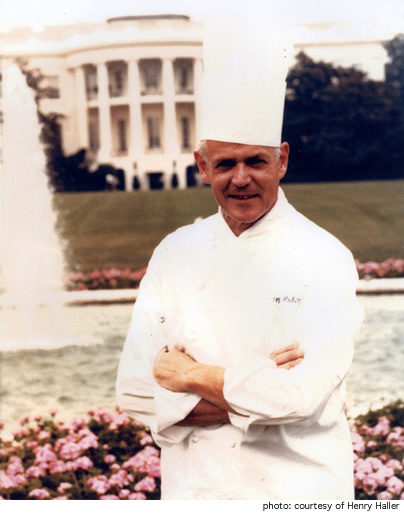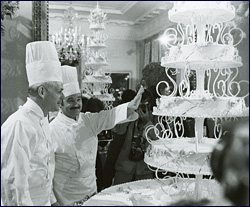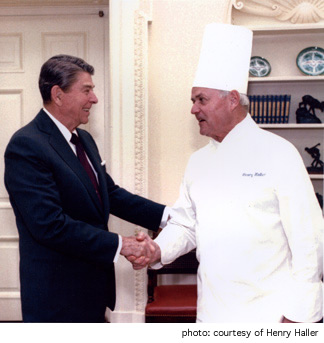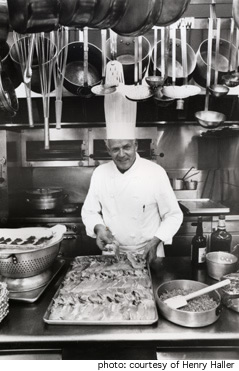FIVE PRESIDENTS AND A BOUT OF SOUFFLÉ
Five Presidents and A Bout of Soufflé
Originally from Altdorf, Switzerland, Henry Haller first apprenticed at the famed Park Hotel in Davos, Switzerland in 1939. He spent a decade perfecting his craft in hotel and restaurant kitchens of Switzerland and then later Montreal. In 1953 he arrived in the United States and a few years later he was the Executive Chef at the Sheraton in New York, commanding a staff of fifty.
In 1966 The White House put out an open call for a Chef. Haller (indifferent to the excitement surrounding this) actually told his wife, ‘Well, if they want me, they can call me.” He actually did receive a call from Lady Bird Johnson, the nation’s First Lady at the time. And he did get excited when he was invited to tour the White House and its kitchens. On January 20 1966, Haller officially became the Executive Chef of the White House. He served under five presidents in a period spanning twenty-two years.
He retired under the Reagan administration and has lived since in Virginia with his wife Carole. We gave Mr. Haller a call to reminisce about his White House days…
So what was a typical day like?
There was no typical day. I have to explain the set up: in the White House we had three kitchens. The second floor kitchen was the First Family kitchen, and then we had the ground-floor kitchen where I handled the menus, cheese, pastries and stuff like that. On the lower level was the kitchen for the resident White House staff.
So on a very good day, I worked eight hours. Very often I had to work on weekends. When the First Family was at the White House, most of the time I had to cook. I had a staff of seven, and on the second floor kitchen I had a staff of five who cooked breakfast and lunch and snacks
On Mondays, I sent up a menu to the First Lady (whoever the First Lady maybe—the first one for me was Mrs. Johnson); I would set the menu up for the week and she checked it. Then she’d she say “It’s fine” or “We have guests” and when they had guests, they served a first course, main course, salad and dessert. But you would be surprised that when most of the presidents and their families dined alone, they didn’t want any desserts. They watched “their line” so that was actually easier–no first course.
So there was no “typical day”. Mostly everyday was different.
We also had luncheons and I always had a good pastry chef, whom I worked together with very closely, because we served pastries and it was this chef who made dessert when we had state dinners.
The Nixon wedding cake was a big deal, I remember seeing that as a child in Lady’s Home Journal—with you and the pastry chef…
You remember that?
Maybe because it was to an Eisenhower—or was it? Well it had to be the equivalent of a Royal wedding —and an international sensation—
Oh it was, it was! But actually Luci Johnson had a wedding there before the Nixon girls—every time you had 600 people—but before that there hadn’t been a White House wedding in a hundred years—so they had to start all over again, “how do we do this?”
There were actually three cakes—God, the press was really involved! And that was the other thing—I really had to be careful about the press. I always told them, ‘You have to call the press office.” You had to be careful because you would never want to embarrass the First Family.
Was it an Eisenhower she was getting married to?
I remember David Eisenhower. I spoke to him quite a few times when he just got married and he was at the White House. Sometimes he was there for a few weeks. He was a very nice man.
Did you ever develop a relationship with the First Family?
Yes, of course. As you know, everybody always gathers in the kitchen. So they’d come to the kitchen and talk to me. I had good relationships with the first family and often the Presidents would come into the kitchen. I spoke to President Nixon quite a bit, you know…
Nixon was a bit of a wine connoisseur —
That’s true, because the press was always after him to use American wines. He liked foreign wines, and at that time, America hadn’t made the progress it has today. At that time I wouldn’t even cook with American wine, and that’s all changed now. They have very good wines. He used to have these very expensive wines, maybe aged 20 or 30 years. He wanted to have French champagne with dessert, and with the first course at state dinners, for which we usually had fish— he wanted a German white wine which is kind of sweet. This surprised me, because personally I prefer dry white wine.
Did this make him more involved in the menu?
Yes he was. He used to talk to me about it. At the time, we served a lot of soufflés. Now, soufflé ideas, they’d go through phases–so we’d talk about soufflés; Swiss cheese soufflés, gruyere soufflés, also desserts flavored with Grand Marnier, chocolate soufflés—President Nixon used to like to talk about things like that. He liked soufflés…
What were Ronald Reagan’s tastes like?
Well, Ronald Reagan’s tastes were like what ever Nancy Reagan’s tastes were like…
So what were Nancy Reagan’s tastes like?
Nancy Reagan liked very fancy foods —beautifully decorated platters; we spent a lot of time on it. She was always very much involved. For example, for the state dinners, she was involved in the menu planning. Before the state dinners took place, I had to cook a “try out dinner” to serve ten people, but most of the time there were only two people in the room. But she wanted to see how I put up the food for ten people.
At that time they had the French service. Everything was served on platters, which I liked very much. Now, since I left the White House—when the Clinton’s came in, they started serving everything on plates. I think it was much better to use platters, it kept the food hot. You didn’t have to put it in the warmer. For instance, I would always have a cold first course which was a fish. Then for the main course, usually meat, all the cutting was done when the first course had left, so everything was presented very fresh…
President Reagan by himself liked very simple foods.
The Carters seemed like modest people…
The Carters were very modest people. They wanted to live in the White House like the average person. They liked Southern cuisine which is a little bit different—certainly not my cuisine. They had a taste for dishes like grilled or fried chicken; they liked vegetables like collard greens and braised mustard greens. Everything was always slightly overcooked, but they were very very nice people.
Before you, there was a French Chef at the White House. He was fired by Lady Bird Johnson because he refused to cook with frozen vegetables.
Mr. Verdon—I met him only once. Perhaps the Swiss are a little bit more flexible…
I think he wanted the First Family, the Johnson’s, to eat the way he wanted the menu—so they ran into problems. He finally left to start his own restaurant in San Francisco and sort of disappeared from then on.
You once said that you could cook in any language—
Ah, well that was a bit of bragging, wasn’t it?
Well you are Swiss, you do have to speak several languages…
French cuisine is my favorite. I have very great admiration for French cooking. First of all, they have a very careful way of approaching vegetables. Eating in France is like a religion. In my time when I made my apprenticeship in Davos (I started in 1939)—I was an apprentice for three years at the Park Sanatorium. At that time, they had lots of sanatoriums for people who were sick with tuberculosis, and the air was fantastic. They didn’t use chemicals to kill the sickness; they had to lay outside covered with a blanket so that the air could dry their lungs out.
The sanatorium was for wealthy people and there we had mostly French cuisine—eating was very important.
What’s your fondest memory of the White House?
Well I was very proud to be able to work at the White House—coming from Switzerland with a suitcase you know, and finally finishing my career at the White House, that was quite impressive…
Of course, it was a great experience everyday I went to the White House. I felt like “Hey, there’s not so many people who can do this.”
Henry Haller’s “The White House Cookbook” is still available on Amazon





